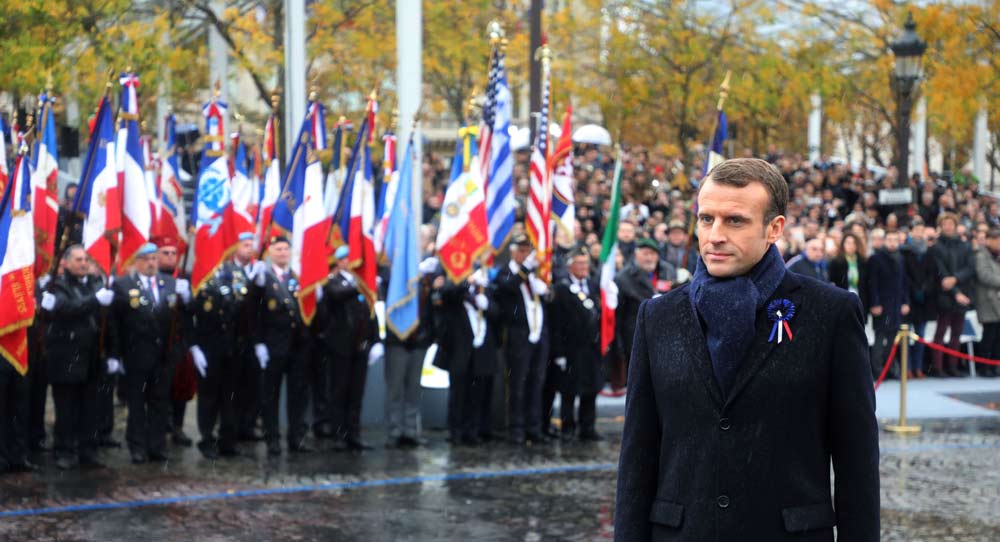As if Europe is in a position to have its own army.
Yet since taking office over 18 months ago, this is something French President Emmanuel Macron has often raised, albeit in different forms. His main goal is to put meat on his European Intervention Initiative (EI2). The idea is that this force would be a coalition of the willing. It would be independent of NATO and the EU member states. It might eventually be able to mount a joint military operation in addition to being able to do things that national governments already do, such as evacuating civilians and providing aid after disasters. So far, Macron’s EI2 consists of ten countries, including Britain, which confirms the close defense ties between Paris and London regardless of the outcome of the Brexit negotiations.
Macron’s EI2 proposal has raised eyebrows in some European capitals. Who would authorize the use of force? What role would the United Nations play? How would the force be funded? Besides, how many times have European leaders waxed lyrical about having high-combat battalions or battle groups at their disposal? Paris and London first launched such an ambitious defense plan back in 1998 at Saint-Malo. We know what happened to that and later ideas. But at least Macron is trying to instill some kind of strategic culture that is sorely lacking in the EU.Apart from his EI2, in the run-up to the centennial anniversary to mark the ending of the First World War Macron called for a “real” European army. “We have to protect ourselves with respect to China, Russia and even the United States of America,” Macron said. “We need a Europe which defends itself better alone, without just depending on the United States, in a more sovereign way,” he added. No one disputes that the Europeans should do more to look after their own security. There’s a transatlantic consensus on those issues.
Macron received some rhetorical support from Angela Merkel. In her speech to the European Parliament on Tuesday, the German chancellor said Europe shouldn’t keep relying on outside protection. “We need to take our fate into our own hands,” Merkel said. “Europe should also work on the vision of one day creating a genuine European army.” But she was quick to state that “this is not an army against NATO, it can be a good complement to NATO. Nobody wants classic ties to be called into question.” So much for substance. Still, she did call for the establishment of a European Security Council with a rotating presidency that would help to streamline European defense and security policy. Now one wonders how that would work in terms of continuity and efficiency.
Macron also used the buildup to the Armistice Day commemorations to criticize U.S. President Donald Trump for “quitting a major disarmament treaty which was formed after the 1980s euro-missile crisis that hit Europe. Who is the main victim? Europe and its security.” Not a word about how Russia in recent years had reneged on the terms of the Intermediate-Range Nuclear Forces treaty.
In the long term, Europe does need its own defense forces. But right now, from a political point of view, it is sowing divisions inside the EU and inside NATO.
In the EU there are enough countries that are suspicious of a French-led European force, even though Europe’s security concerns do not always coincide with America’s. Poland, among others, fears a European army would weaken NATO and in turn weaken bonds with the United States. As it is, Warsaw is forging a special strategic relationship with Washington rather than putting its weight behind strengthening a European defense and security policy. But then again, Poland’s political influence inside the EU is now very weak. In contrast, Finland and Sweden—which are not NATO members—have stepped up ties with the U.S. military.
The view from inside NATO is also revealing. There is a consensus that NATO and the EU have to work much more closely together when it comes to military and civilian cooperation. There is also a consensus that any competition between NATO and the EU when it comes to military engagements is a nonstarter. It is wasteful. It would lead to duplication of scarce resources and capabilities. Right now, the EU and NATO’s European members are plagued with inefficiencies across the defense sector, from having several different tank and helicopter models to countries jealously guarding their defense industries instead of streamlining them.
But what irks NATO officials about Macron’s latest call for a “real European army” is the timing and how it was justified. “Very insulting,” Trump tweeted. “But perhaps Europe should first pay its fair share of NATO, which the U.S. subsidizes greatly,” he added.
Beyond those tweets, NATO diplomats explained that Macron’s ideas could make it more difficult for Atlanticists back in the United States to persuade the Trump administration to support the EU and NATO. “It’s bad enough, Trump criticizing the Europeans and really not caring that much about them,” a NATO diplomat told Carnegie Europe. “But Macron’s way could be interpreted as Europe itself drifting from the United States,” he added.
And of course there is the view from Russia. While the Kremlin flouts the INF treaty—with, little criticism from the Europeans, unlike their harsh response to Trump’s decision to withdraw from it—Moscow can relish Macron’s accusations against the United States. Weakening and dividing NATO has always been Russia’s goal. Weakening and dividing the EU has been another one of its aims. Western leaders are unwittingly helping Putin.






